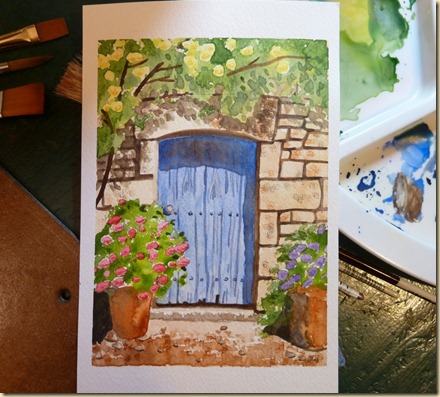Never before have I lost my glasses. They’ve always been stuck to my face, ever since the third grade when I crept into class that first day with my new cat-eye glasses. But now, there are multiple pairs… and where did I put those reading glasses?!
And there are pills doled out at breakfast—Am I becoming my mother?! Pills to make up for missing sunshine. Pills to rejuvenate aging eyes. Pills to ward off aging…(?!)
And what’s this minty scent that wafts me through my days? Ben-Gay?! Yes, they still make the stuff, but surely this sore shoulder muscle isn’t here to stay…
Hmm… skin cancer, could this little spot be it? I have just read up on what ”Basal Cell Carcinoma” is. Now for the doctor’s appointment. Whoever thought about these things before?
Yes, it’s really come to this. I’m getting old. I’m past the half-way point and heading for the home lap assuming it will be shorter, harder and less fun than the first half but really not at all clear what it will be like! Family life is all I’ve known. I peek back over my shoulder at the happy olden days and wonder how I can pack them away in albums and move on before turning into a pillar of salt from the tears!
To compound my sense of loss, my career as a homeschool teacher of 23 years is ending, abruptly, soon. I feel like a student myself with this deadline looming with such finality. Whether I learned all my lessons or not, whether the assignments got done well or not, the term is up. My work is due ‘as is’ for grading. How did I do? What have I accomplished? There is no grade point average for me this time around. My five graduates will live with the results, for better or worse. (Now there’s a disturbing thought!)
And I’m aching for reassurance that I did good. (I know that’s not good grammar, but it’s what a soul wants to know). I don’t need affirmation in the Comment Box, I need to hear from my Supervisor that He is pleased. Only His Words will suffice to displace this sagging feeling that my best was not good enough.
Never mind ‘best’, who can honestly say they’ve done their best day in-day out for the length of a career? Really? No, we bring at our work what we have to bring, ourselves. And being human and faulted with great cracks and fissures, we bring our weaknesses. These too go into the mix that will make up the final product. All these years and lesson plans and books later I have completed my assignment. The term is ended. But I’m not sure I’ve done a good enough job. Five fledgling adults educated under my watch are trying their wings in the real world while I sit on the sidelines watching, and waiting, and wondering how we’ve done (and what’s next?!)…
Against this backdrop of doubt and insecurity God speaks Words I need to hear: a call, a gentle correction and a healthier orientation. And I must admit, deep down past all my Eeyore impulses and growing (old) pains, I am excited despite myself for what’s to come. I am ready for a new stage. As armloads and boxes of books head out the door the bookshelves stand enticingly empty for a new round of learning. Living spaces too are refigured for new purposes. Life is brightened with endless possibilities. I’ve even found renewed enthusiasm for gardening. Turning soil and pulling weeds in hopes of new life to come is therapeutic!
But just case you too are in a stage not quite comfortable, not quite confident, not quite all you hoped it would turn out to be, may I offer you the words that have encouraged me this week—a call, a correction, and a new orientation?
First there was this call. A friend unwittingly pointed me here, to Solomon’s love Song, a picture of lover’s bliss and ultimately of Christ’s love for His bride. May I paraphrase the Lover’s words?
Listen, hear the birds, see the flowers? It is springtime. So, ‘arise, my love, my beautiful one, and come away….let me see your face, let me hear your voice…catch the foxes for us, the little foxes that spoil the vineyards, for our vineyards are in blossom.’
In each new season of life, Christ calls us to come to Him, to talk to him, to be known by Him, and not to let anything spoil the yield in our vineyard.
In these winsome words I am reminded of my primary calling, to know and be known by Christ. This is what really matters. Many will call Him ‘Lord, Lord’ and point to all their ‘wonderful works’ as evidence of this relationship, but He will profess: “I never knew you; depart from me.” Mt.7:22,23 No amount of work done in His name will make up for a failure to be known by Him. He’s not so much interested in what I’ve done, as in knowing me. And so He calls, “come away…let me see your face, let me hear your voice…”. Here is my invitation to put aside doubts of sufficient worthiness and relax ‘as is’ in the sheer delight of being His desired companion.
A gentle correction came one quiet morning as I sat by the woodstove warding off the chill, reading and thinking, and fretting too, over my failures in this final year of school—technical details and ‘holes’ in our education. The story of Martha and Mary was before me and I heard Martha’s accusation as I had not heard it before: “Lord, do you not care that I have to do everything? Tell Mary to help.” Jesus wouldn’t consent. He knew Martha was pre-occupied with lesser things and that Mary had found what was important.
How easy it is to use prayer as a means of getting God to see we need help that He can surely provide. Surely He will help us accomplish our goals. How often have I been frustrated this year that school is not what I want it to be? And even now, short on weeks and long on unmet goals Jesus’ words come with gentle reproof: Linda, Linda, “you are anxious and troubled about many things, but one thing is necessary.” And what was that one thing that Mary was doing? She was sitting at Jesus’ feet and listening to His teaching.
Martha had been the one to welcome Him into their home, but she’d lost sight of the value of His company, in her conscientious effort to serve Him. And again a still small voice beckons me to let go my determination of what needs to be done and listen to what’s on Jesus’ heart. After all, were we to master all the finer points of grammar and writing, of science and math yet not have learned to value time spent with Jesus, what would we have accomplished?
Lord, forgive my obsessions with lesser things. Thank-you for denying my demands in order to point me to what is most important. I am grateful. Make your priorities for my kids mine also. When your Kingdom and your Righteousness are first in our hearts, the rest will fall into place as you intend. (Mt.6:33)
The final word of encouragement that has given me a fresh orientation came by way of a wise blogger mom at a similar life stage to my own. In her ‘keeping it real’ way she arrested my attention with these words: “It is not our calling to ‘raise Godly children’”. What?! She went on to clarify by way of contrast:
“It is our calling :
- to be authentic believers and live out the gospel before our children.
- to nurture, instruct, guide, love, and pray for our children.
- to share God’s Word, and share the gospel with our children.
God is the only one who can work in a child’s heart and change him into a godly person. His Spirit draws them, opens their eyes, and changes and matures them.”
–Gina Smith at http://www.keepinitrealgina.com
A subtle shift in meaning, you say? No, for me it was an essential reminder not to assume a role never intended for me. It may be my desire for my children to all be more perfect and godly than I, but this is not my job description. It cannot be. Only God can make any of us godly! We are called to love, to nurture, to teach and to discipline and perhaps most of all to depend on God to do these things through us and in spite of us. We all fail in many ways. We don’t do the things we ought, the things we wish we had, or even all the things we could. But God in His great mercy calls us each to Himself, loves us dearly and invites us to know and be known by Him. And at my age, this is a good place to have come to.
–LS
For we know in part and we prophesy in part,
but when the perfect comes, the partial will pass away. I Cor.13:9,10
For now we see in a mirror dimly, but then face to face. Now I know in part; then I shall know fully, even as I have been fully known. So now faith, hope, and love abide, these three; but the greatest of these is love. I Cor.13:12,13
“My beloved is mine, and I am his…” Sgs.2:13


